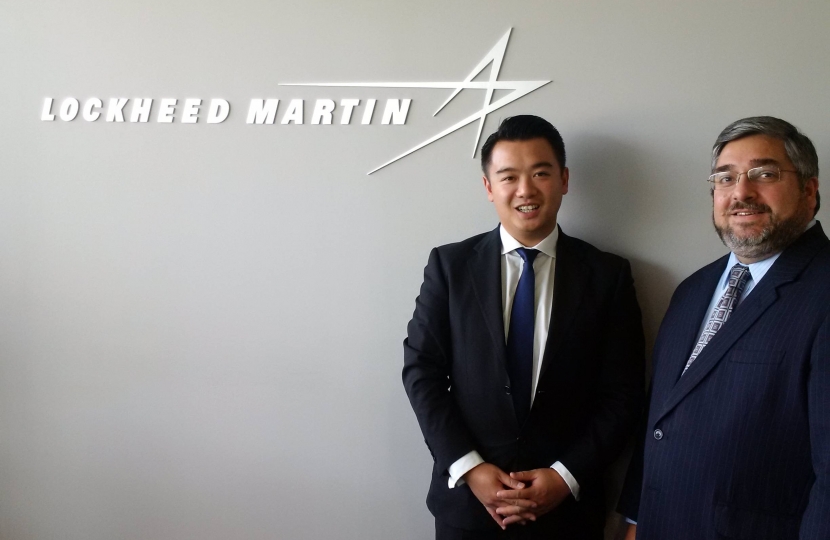
Picture: Alan Mak MP discusses the Fourth Industrial Revolution with Bob Kramer
Havant MP Alan Mak made Commons history when he became the first British politician to lead a Westminster debate on the Fourth Industrial Revolution (4IR).
The subject has been a hot-topic since it was made the focal-point of the World Economic Forum’s Annual Meeting earlier this year and describes the new wave of technology that’s changing the way we live and work. Drive by the growth of artificial intelligence, internet connectivity and automation, mastering the 4IR is a key component of the Government’s new industrial strategy.
It could see everything from the rise in machines capable of trading hedge funds without human intervention to 3D printers giving consumers more power over what they buy. It follows three previous industrial revolutions characterised by steam power, manufacturing automation at the turn of the 19th century and the explosion in computing power 40 years ago.
Mak believes the Havant area can be a national leader in the Fourth Industrial Revolution as a home to new businesses and jobs in the sector.
During the Westminster debate in the main Commons Chamber, Mr Mak called on the Government to take a “positive and pro-active approach” in placing the 4IR at the “heart of its new Industrial Strategy”. The Conservative MP says it is important to be fast-moving in order to give the UK a “comparative advantage” on the rest of the world.
Despite highlighting the benefits that the 4IR could bring, with lower production costs and cultural benefits, Mr Mak cautioned that jobs could be under-threat if the workforce was not up-skilled. Continued improvements to digital infrastructure, such as 5G mobile and broadband internet, was also highlighted as being of vital importance.
Mak said: “We must act now to ensure that Britain’s political and economic structures are fit for purpose so we lead the world when it comes to the Fourth Industrial Revolution. From investment in digital infrastructure to reform of our education and welfare systems, government has a key role to play.”
Mak added: “At the same time, we must address the Fourth Industrial Revolution’s shortcomings too, making sure that nobody is left behind as disruptive technologies reshape our economy and society. This new industrial revolution must consist not of changes that happen to us, but changes that work for all of us.”
“The Havant area can lead the country in the new Fourth Industrial Revolution. We’re already home to great technology and engineering businesses, whilst new local start-ups like Dream 3D show entrepreneurs are giving our area a vote of confidence when it comes to new jobs.”
With speakers from all sides of the House echoing his call, Mr Mak says he will continue efforts to keep the 4IR at the top of the Government’s agenda.
The MP says he was partly inspired to take up the cause after witnessing some of the 4IR companies that operate in Havant, including Dream 3D and Lockheed Martin.
Dream 3D is a new start-up based at the Basepoint Business Park on Harts Farm Way, and a regional leader in 3D printers. Founder James Preen and his growing team sell a range of 3D printers, and provide training on their use.
At the other of the scale, defence contractor Lockheed Martin are experts in “big data” and have used their expertise to develop a new parcel tracking system for Royal Mail which helps track packages more accurately as the e-commerce economy grows.
Bob Kramer, Vice President and Group Managing Director at Lockheed Martin UK based in Havant, said that the world was in the middle of a “revolution” and the 4IR was “changing the rules of business”.
He said: “The Fourth Industrial Revolution is creating a new dynamic, it’s bringing about new and exciting opportunities - driving efficiencies through technology and is right at the centre of new product and service development."


